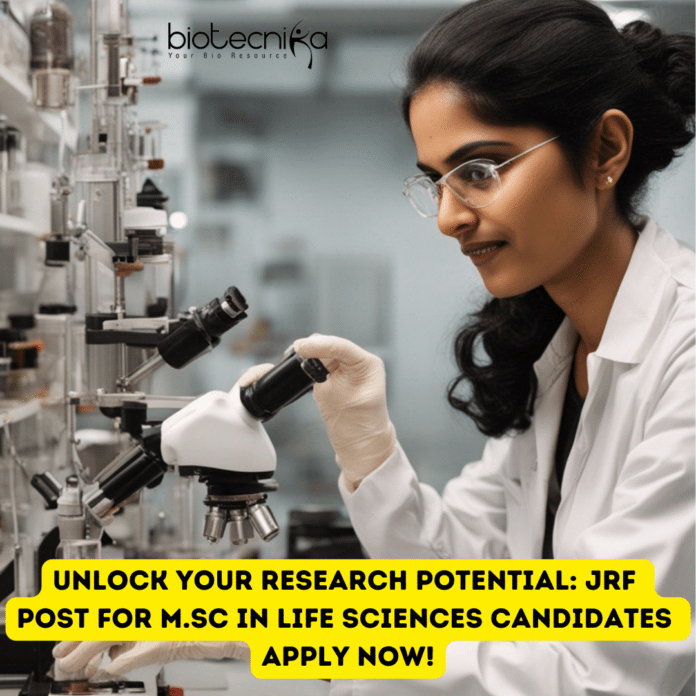JRF Post at JNU Delhi For MSc Biotech, Biological & Life Sciences
JRF Post at JNU Delhi For MSc Biotech, Biological & Life Sciences. Latest JRF and TA position at JNU, Interested and eligible candidates check out all the details given for the same below.
This job expires in
SCHOOL OF LIFE SCIENCES
NEW DELHI – 110067
POSITION AVAILABLE
Ref. No.: JNU/SLS/SGN/DBT/1476/Adv./JRF/23-24
Date of Advertisement: 4 Sep, 2023
Applications are invited for a JRF and TA posts in SERB-DST sponsored project titled : “Exploring deoxythmidine triphosphate pathway for the development of therapeutics against H. pylori”.
Job position: Junior Research Fellowship
Age: Not more than 40 years
Tenure: The position is purely temporary for one year and may be extended until early (the end of project) based on satisfactory performance.
How to Apply:
Potential candidates are invited to apply on a plain paper with CV to the under mentioned by 14Sep, 2023 by email to [email protected].
Shortlisted candidates will be called for interview by email. Please note there will be NO TA/DA attending the same.
Prof. S. Gourinath
Lab. No. 417/430
School of Life Sciences
Jawaharlal Nehru University
New Delhi – 110067
Qualification
JRF: – M.Sc in life sciences / Biotechnology / or any biological sciences with NET qualification.
Desirable: Experience in molecular biology, cell biology and structural biology with at least one publication in related area.
Fellowship/Salary: As per DBT norms.
Click here for the notification
Possible interview questions may be asked for JRF Position at JNU
1. Can you describe your educational background and research experience in the field of life sciences or biotechnology?
Answer: Certainly. I hold an M.Sc. in [mention specific field] and have [mention years] of research experience in areas related to molecular biology, cell biology, and structural biology. I am particularly interested in [mention specific research interests].
2. Do you possess NET qualification, and if so, how has it contributed to your research career?
Answer: Yes, I have NET qualification. It has been instrumental in advancing my research career by providing a platform for rigorous research work and opportunities for professional growth. It has also opened doors for collaborations and access to valuable resources.
3. Could you discuss any specific research projects or publications you’ve been involved in that are relevant to this position?
Answer: Certainly. I have had the privilege of working on [mention specific project] where I [briefly describe your contributions]. This project resulted in [mention any significant outcomes or publications]. My experience in this project has equipped me with valuable skills and insights applicable to the current position.
4. How do you plan to contribute to the project titled “Exploring deoxythymidine triphosphate pathway for the development of therapeutics against H. pylori”?
Answer: I intend to contribute by leveraging my expertise in [mention relevant skills or techniques] to explore and understand the deoxythymidine triphosphate pathway. This knowledge can potentially lead to the development of therapeutics against H. pylori. I am eager to collaborate with the research team to achieve our project goals.
For TA (Technical Assistant):
1. Can you provide details about your educational qualifications and any relevant experience working in a research lab?
Answer: Of course. I have completed my graduation, including at least the 12th class with a science background. Additionally, I have [mention years] of experience working in a research lab, where I have been involved in tasks such as [mention specific lab responsibilities].
2. What is your experience in handling laboratory equipment, preparing media, and maintaining lab facilities?
Answer: I have significant experience in handling laboratory equipment, including [mention specific equipment], preparing various types of media for experiments, and maintaining lab facilities. This experience has enabled me to contribute effectively to research projects.
3. Working in a research lab often involves multitasking. How do you manage multiple responsibilities efficiently, especially when dealing with unexpected challenges?
Answer: Effective multitasking requires adaptability. I maintain a well-organized schedule, set clear priorities, and allocate time for unexpected challenges. Open communication with colleagues allows us to support each other during busy periods.
4. Can you describe your experience with maintaining laboratory records and ensuring data integrity in a research environment?
Answer: I have a meticulous approach to maintaining laboratory records. I ensure that all data is recorded accurately, protocols are followed consistently, and any deviations are documented appropriately. This commitment to data integrity is fundamental in research.
Editor’s Note: JRF Post at JNU Delhi For MSc Biotech, Biological & Life Sciences. Please ensure you are subscribed to the Biotecnika Times Newsletter and our YouTube channel to be notified of the latest industry news. Follow us on social media like Twitter, Telegram, Facebook and Instagram.

































